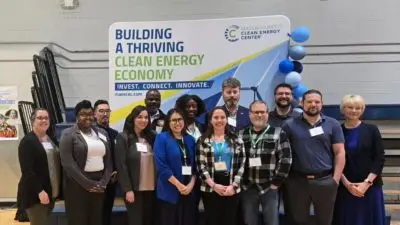Once you’ve booked an assessment with HomeWorks Energy, you’re on your way to improving the efficiency of your home, but what should you expect?
HomeWorks Energy has a team of about 80 home energy specialists across the state, and one of these certified assessors will arrive at the door on the day of the audit. The energy specialist starts assessing the property from the moment they step out of their car. They take a cursory glance at things like what type of roofing is on the house, assess the siding, and look at the ventilation. These mental notes will come in handy later on in the assessment.
The specialist will knock on the door, introduce themselves, enter the house, and, soon after, will ask to set up a laptop on a nearby table. The assessor will likely ask to look at your electric and heating bills, which are important to have on hand to identify heating and cooling trends. Trends will give the specialist a first glance into the home’s energy consumption and the assessor will start strategizing ways to rollback those costs in the home.
Soon after, the specialist will ask to see the heating and hot water system. It’s important to make a clear path to the appliances before the audit occurs. Once there, the assessor will identify the systems and get an approximate age of the appliances. They conduct a series of tests on the equipment to ensure it’s running safely and efficiently.
They will check three key areas where air tends to enter and escape the house, including the basement, walls, and attic.
Once the combustion safety test has been completed, the specialist checks your home from bottom to top for insulation. They will check three key areas where air tends to enter and escape the house, including the basement, walls, and attic. Houses operate a little like a chimney, where the air comes in through the bottom and escapes through the top, through a principle called the “stack effect”. The stack effect is the reason it’s important to insulate the basement, walls, and attic in an attempt to minimize airflow throughout the house.
The specialist then moves on to changing out any incandescent light bulbs you have to efficient LED lights, which are provided through the Mass Save program. The assessor will also install water-saving measures, programmable thermostats, and deliver two smart power strips—all of which will start saving money in the home immediately.
At the end of the audit, the specialist sits down for about 20 minutes to input data into their computer, and then prints off a series of paperwork that goes into detail about what they found during their walk-through of the home. They will explain insulation techniques that can be used in the house to seal it up tighter and will discuss other ways to save money and energy in the home. The energy specialist will also discuss how much money you will start saving as a result of the instant savings measures that they installed in the home.
Once you have all of the information in hand, it’s your choice if you want to move forward with the work or not. Mass Save provides 75 percent to 90 percent off the cost of insulating homes, which, oftentimes, makes the decision about whether or not to proceed easier. There’s no obligation to sign up for an energy audit and if you’re a resident paying into the Mass Save program on your electric or gas bill then you’re eligible to have an assessment every two years.








